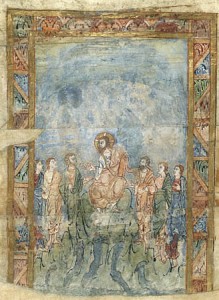
Consuming Fire
Our God is a consuming fire, the Scriptures tell us (see Hebrews 12:29; Deuteronomy 4:24).
And in this week’s Gospel, Jesus uses the image of fire to describe the demands of discipleship.
The fire he has come to cast on the earth is the fire that he wants to blaze in each of our hearts. He made us from the dust of the earth (see Genesis 2:7), and filled us with the fire of the Holy Spirit in baptism (see Luke 3:16).
We were baptized into his death (see Romans 6:3). This is the baptism our Lord speaks of in the Gospel this week. The baptism with which He must be baptized is His passion and death, by which He accomplished our redemption and sent forth the fire of the Spirit on the earth (see Acts 2:3).
The fire has been set, but it is not yet blazing. We are called to enter deeper into the consuming love of God. We must examine our consciences and our actions, submitting ourselves to the revaling fire of God’s Word (see 1 Corinthians 3:13).
In our struggle against sin, we have not yet resisted to the point of shedding our own blood, Paul tells us in this week’s Epistle. We have not undergone the suffering that Jeremiah suffers in the First Reading this week.
But this is what true discipleship requires. To be a disciple is to be inflamed with the love of the God. It is to have an unquenchable desire for holiness and zeal for the salvation of our brothers and sisters.
Being His disciple does not bring peace in the false way that the world proclaims peace (see Jeremiah 8:11). It means division and hardship. It may bring us to conflict with our own flesh and blood.
But Christ is our peace (see Ephesians 2:14). By his cross, he has lifted us up from the mire of sin and death—as he will rescue the prophet Jeremiah (see Jeremiah 38:10).
And as we sing in the Psalm this week, we trust in our deliverer.
Pope Benedict Angelus Address, August 19, 2007
In this Sunday’s Gospel there is an expression of Jesus that always attracts our attention and needs to be properly understood.
While he is on his way to Jerusalem, where death on a cross awaits him, Christ asked his disciples: “Do you think that I have come to give peace on earth? No, I tell you, but rather division”.
And he adds: “[H]enceforth in one house there will be five divided, three against two and two against three; they will be divided, father against son and son against father, mother against daughter and daughter against her mother, mother-in-law against her daughter-in-law and daughter-in-law against her mother-in-law” (Lk 12: 51-53).
Anyone who has even the slightest knowledge of Christ’s Gospel knows that it is a message of peace par excellence; as St Paul wrote, Jesus himself “is our peace” (Eph 2: 14), the One who died and rose in order to pull down the wall of enmity and inaugurate the Kingdom of God which is love, joy and peace.
So how can his words be explained? To what was the Lord referring when he said he had come – according to St Luke’s version – to bring “division” or – according to St Matthew’s – the “sword” (Mt 10: 34)?
Christ’s words mean that the peace he came to bring us is not synonymous with the mere absence of conflicts. On the contrary, Jesus’ peace is the result of a constant battle against evil. The fight that Jesus is determined to support is not against human beings or human powers, but against Satan, the enemy of God and man.
Anyone who desires to resist this enemy by remaining faithful to God and to good, must necessarily confront misunderstandings and sometimes real persecutions.
All, therefore, who intend to follow Jesus and to commit themselves without compromise to the truth, must know that they will encounter opposition and that in spite of themselves they will become a sign of division between people, even in their own families. In fact, love for one’s parents is a holy commandment, but to be lived authentically it can never take precedence over love for God and love for Christ.
Thus, following in the footsteps of the Lord Jesus, in accordance with St Francis of Assisi’s famous words, Christians become “instruments of peace”; not of a peace that is inconsistent and only apparent but one that is real, pursued with courage and tenacity in the daily commitment to overcome evil with good (cf. Rom 12: 21) and paying in person the price that this entails.
